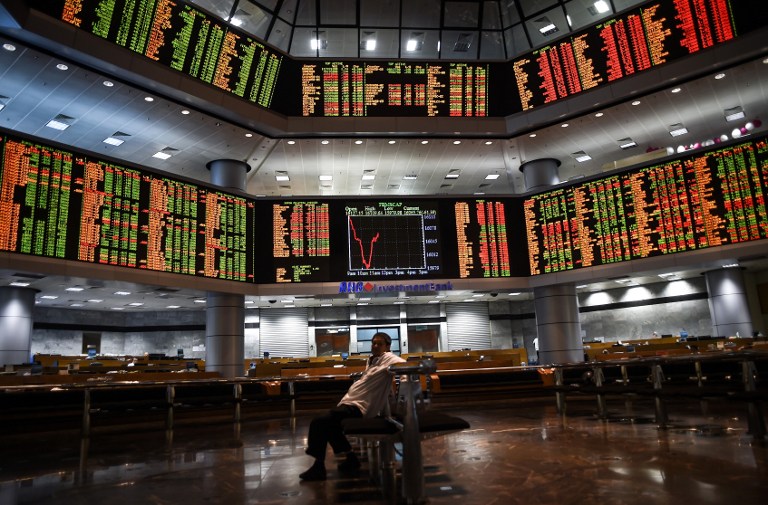Asia stocks extend losses after weak China data, Tokyo slumps

A man sits before electronic boards showing stock movements at the Malaysia Stock Exchange in Kuala Lumpur on July 28. Asian stocks sank Tuesday, Sept. 1, after more data showed weakness in China’s economy. AFP
HONG KONG—Asian stocks sank Tuesday after more data showed weakness in China’s economy, while gold and the yen advanced as investors fled to safer assets.
The Tokyo bourse, which shed almost 4 percent, was the biggest loser in the region, providing a lead for the major European markets, which opened sharply down.
Uncertainty over interest rates in the United States was also unsettling traders ahead of a closely watched jobs report due later in the week.
A rate rise could further jolt global confidence, which has already been buffeted by a slowdown in China’s economy that has also hammered the country’s stock markets.
“Investors are concerned about the strength of the global economy, which is why you’re seeing a sell-off in various stock markets,” said Ayako Sera, a strategist at Sumitomo Mitsui Trust Bank Ltd. in Tokyo.
Article continues after this advertisementThe Shanghai market ended down 1.23 percent at 3,166.62—having dived more than four percent at one point—after China’s statistics bureau said its Purchasing Managers’ Index (PMI) of manufacturing activity came in at 49.7 last month, its lowest for three years.
Article continues after this advertisementA rating over 50 indicates expansion, under denotes contraction.
Tokyo dived 3.84 percent to 18,165.69, with a stronger yen hitting exporters. Sydney fell 2.12 percent to 5,096.4 and Seoul gave up 1.40 percent to close at 1,914.23.
Hong Kong ended 2.24 percent down at 21185.43.
And in early European trade London was 2.4 percent lower, Paris shed 2.5 percent and Frankfurt sank 2.6 percent.
“The manufacturing index still shows that the economy is in the process of seeking a bottom,” said Wu Kan, a Shanghai-based fund manager at JK Life Insurance.
“The market is unlikely to pick up any time soon.”
Shift to safety
China’s stock markets have slumped 40 percent since hitting a June 12 peak, with investors concerned about high valuations and the underlying strength of the world’s number two economy.
The seeming inability of Communist Party leaders to stem the crisis—five interest rate cuts since November have not staunched the sell-off—has raised wider fears about their ability effectively to manage China’s transition from low- to middle-income economy.
In the latest bid to avert further losses, Beijing urged listed companies to merge and restructure.
Authorities will strongly encourage tie-ups to help push reform of state companies and inject vitality into the economy, a joint statement released by four government agencies said late Monday.
The notice also stressed measures to underpin the stock market, including encouraging firms to pay cash dividends, encouraging investors to hold stock for the long term, and urging companies to buy back their own stock—measures that should boost prices.
Volatility in China and other emerging markets has pushed up the price of investments considered safe, including the yen and bullion.
On Tuesday the dollar fell to 120.00 yen from 121.24 yen in New York trade Monday, while gold traded at $1,143.20, against $1,131.62 late Monday.
Oil prices fell in Asia after recording gains of more than 25 percent over the previous three sessions.
US benchmark West Texas Intermediate for October delivery fell $2.00, or four percent, to $47.20 and Brent crude for October dropped $2.27, or 4.2 percent, to $51.88 a barrel.
The commodity surged Monday after the US Department of Energy said domestic output in June was much lower than first stated, while monthly estimates for January-May were revised lower.
Also, a statement from the Opec oil cartel—to the effect that the continuing downward pressure on prices “remains a cause for concern”—fueled hopes it will cut its own output levels.
Among other Asian stock markets, Wellington dipped 0.02 percent to 5,654.99 and Taipei sank 1.92 percent to 8,017.56, while Manila was 0.17 percent lower at 7,086.86.
In Mumbai stocks dropped 2.23 percent to 25,696.44, while Malaysia’s key stock index lost 0.22 percent to close at 1,609.21.
Bangkok slipped 1.45 percent to 1,362.39, Singapore fell 1.32 percent to 2,882.77 and Jakarta also ended down 2.15 percent at 4,412.46.